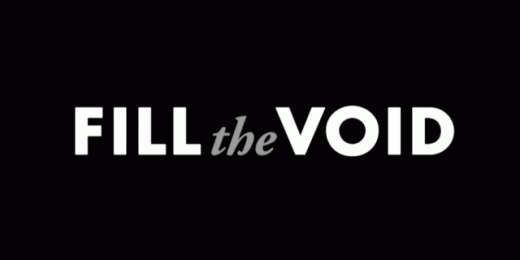2012 will be remembered as the year in which Israeli movies finally found God.
It’s not often a film critic gets the chance to identify a major new trend unspooling before his eyes and to call it out in real time. I mean a real shift, not one of those over-hyped faux trends that magazines fabricate every season. It usually takes a generous amount of hindsight to recognise a true change, a development that will be long-lasting, perhaps even revolutionary. But it is already clear that 2012 will be remembered as the year in which Israeli movies finally found God.
The signs are everywhere. Fill The Void, the first Israeli feature directed by a Haredi (ultra-Orthodox) director – and a woman to boot, in a culture in which even the most secular films are rarely directed by women – is captivating hearts at the Venice Film Festival, en route to Toronto, New York and London (some of the most distinguished festivals in the world). It is almost certain to win the Ophir Award for Best Picture (Israel’s Academy Award), which automatically makes it Israel’s official entry to the Best Foreign Language category at the Oscars. If it was surreal seeing the film’s director Rama Burshtein in Venice, walking up the red carpet with her husband in his traditional Hassidic garb, imagine them doing it in Hollywood.
Fill The Void is not alone. There is also Menny Yaish’s God’s Neighbors, which won the Best First Feature award at the Jerusalem Film Festival, and before that lifted the SACD award at the Cannes Film Festival sidebar, the Director’s Fortnight. And don’t forget Tateh, a student film that won the Best Short Film award at the Jerusalem Film Festival earlier this year.
What do these films have in common, apart from the fact that they are all excellent (albeit, very different in style and content from each other)? They all deal with faith and religion, and do so from a sympathetic point of view. Indeed, most of them were actually made by religious film-makers associated with a spiritual awakening that has swept Israel in the last several years.
In fact, what is happening now in Israeli cinema has already happened in Israeli music. It started when several of Israel’s biggest recording artists became people of faith, and began leading an observant Jewish lifestyle. Some of them, such as Evyatar Banai and Amir Benayoun, became Haredim but their shows and albums – nothing like Christian Rock in the USA, nor Jewish Gospel; it’s still rock but it’s soulful – continued to be hugely popular, even with their secular fans. Later, as more pop stars found faith and became observant, those religious pop stars formerly known only to listeners of religious radio stations, broke out into the mainstream. It is as likely to find a love song to The Lord topping the pop charts these days as it is to find a love song to a girl.
(To be clear, I write about this development with great empathy and growing curiosity. The spiritual renewal did not exclude me: I had my own dip in this cultural pool as the co-creator of Kathmandu, a scripted prime time TV series about a Chabad couple in Nepal that became hugely popular this summer.)
Fill The Void tells the gorgeously-shot story of a young Hassidic woman (in Tel Aviv, not Jerusalem!) who has to decide whether to marry her late sister’s husband. We slowly realize she probably had a huge crush on him even when her sister was alive. This contributes to her guilt while other spiritual, practical and emotional obstacles also make her hesitate. Reviewers in Venice likened the film to a Jane Austenesque story (indeed, the ultra-Orthodox Hassidim try to maintain something of an 18th century lifestyle, albeit with cellphones).
In stark contrast to the feminine gentleness and lusciousness of Fill the Void, stands the alpha-male, edgy, nervy, violent Jewish Gangsta film God’s Neighbors, which is more Jean-Claude Van Damme than Jane Austen. Three childhood friends become born-again believers, but use faith to fuel their thuggish desire to crack skulls.
Leaving the life of breaking and entering behind them, they instead find an adrenaline rush when they beat up a porn salesman or intimidate women whose clothes they believe do not show respect to the Lord and his followers. The film’s brilliance lies in the way it juxtaposes the hero’s falling in love to his dawning realisation that his brutal and vindictive Judaism is not the Lord’s way, but merely his own way; a human, all too human venting of violent tendencies that he has masked as religious zeal.
These two films are like an earthquake because Israeli cinema has always been a secular stronghold. Hitherto, faith never entered the picture. On the rare occasion you would find a religious Jew in an Israeli film it would be either a comic character, usual Sephardic, or a negative character in a film critiquing Orthodox resistance to modern values and lifestyles (think of Amos Gitai’s infuriating Kadosh). Joseph Cedar, the two-time Academy Award nominated director ofBeaufort and Footnote, was something of a novelty: an observant Jew (although far from being ultra-Orthodox) who made three films about religious communities in and around Jerusalem.
The new wave of Haredim filmmakers shock because the Haredim usually keep to themselves, rarely watch television or go to cinemas, let alone make films. The pioneer was Shuli Rand, an award winning actor of stage and screen who became Haredi and who, after his Torah studies, returned to the forefront of Israeli culture, this time with a long beard and a black Hassidic gown. His film,Ushpizin, which he wrote and starred in, was a huge success in 2004. Then his album, Good Point, was a hit, and his live shows sold out. Yet his audience is mostly the same kind of people who protest against government aid to those Haredim communities where Torah studies are more important than a paying career and poverty is on the rise. At this time, when the political rift between secular Israel (‘The Zionists’, as the ultra-Orthodox call them) and the Haredim is getting wider and more vocal, the embrace of religious films by the secular film community is something of a big deal. It was not expected.





































